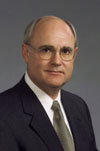Academic, research director a ‘faculty advocate’
by George SpainIS Technical Publisher
Referring to himself as a “faculty advocate,” W. Roger Poston II, Ph.D., began his tenure as the Office of the CIO’s director of academic and research systems recently, filling one of the last vacant director’s posts of vice president for Information Technology and CIO Frank Clark, Ph.D.
 Dr. Roger Poston
Dr. Roger PostonPoston set his sights on the first 100 days at his new job to “get to know the real day-to-day needs of the faculty and the research community.” Poston held a similar position at Wake Forest University where he was director of Biomedical Communications.
“Roger was our first choice out of a very strong final three candidates,” Clark. “We were impressed by his experience and his background in so many disciplines.”
In his role, Poston is expected to do a little bit of everything from listening to faculty input, to evangelizing software standards, to fund raising. What he’s counting on to help him most is his background as a classroom teacher for more than 20 years.
“I know the problems faculty face because I’ve faced them, too,” he said. He also knows that standards might be a tough sell in the traditionally decentralized academic community of MUSC.
Poston will also focus on student needs. “They are the reason the rest of us are here at the university. They deserve the best service, support, and access we can provide. This means more than online registration and fee-paying, it means access to the tools of academic achievement—bibliographical reference, research information, e-mail, etc.”
Perry V. Halushka, M.D., Ph.D., dean of the College of Graduate Studies, invited Poston to attend next week’s student town hall meeting.
“If I do this job right, we will get the right resources to the right people at the right time. It doesn’t matter if the work is done on a Windows PC, a Macintosh, or any other kind of computer. What matters is that we (Office of the CIO) provide the right tools to get the study or research done,”he said.
While he fully embraces Clark’s vision that technology is not an end in itself, but a tool among other tools to help fight disease, define new protocols, create new drugs, and bring financial success to the organization, Poston also sees a bright future for the emerging technologies associated with distance learning, telecommunications, and collaborative teaching.
He’s had a hand in developing these technologies for use to combat one of today’s worst-case scenarios— bioterrorism. While at Wake Forest, he was a telehealth representative of the North Carolina Bioterrorism Response Task Force.
“We dealt with issues related to NCB (nuclear, chemical, and biological) attacks. Issues like ‘how do we keep contamination from spreading after an incident while still getting help to the victims?’, “ he said.
One of the answers is to connect local health clinics throughout the entire state. In this way, various experts, without being on the scene, can help local responders provide effective care.
Poston was also a member of the North Carolina Rural Internet Access Authority, a group devoted to bringing Internet access to homes and businesses in rural areas throughout the state.
He’s already impressed with the College of Medicine’s Distance Learning Grant to develop collaboration between MUSC and the University of South Carolina. The two universities recently integrated their pharmacy schools. He’s also impressed with the College of Nursing’s teleconferencing initiative promoting continuing education as well as the extensive use of technology in the new facilities of the College of Health Professions.
Poston feels strongly about Internet2, a government/industry collaboration that links higher education sites (like Duke, MUSC, Georgia Tech, USC, etc.) and their research departments over super high-speed broadband networks with much less clutter than the regular Internet, which is often clogged with commercial traffic. Internet2, he said, makes it possible to deliver cost effective conferencing, distance education, collaborative research, and clinical applications with two-way connectivity and full-motion video.
As for the present time at MUSC, Poston says he’s mostly going to listen to faculty members. His calendar is already getting filled with appointments to meet with deans, administrators, and faculty members to assess technology needs.
Friday, April 22, 2005
Catalyst Online is published weekly,
updated
as needed and improved from time to time by the MUSC Office of Public
Relations
for the faculty, employees and students of the Medical University of
South
Carolina. Catalyst Online editor, Kim Draughn, can be reached at
792-4107
or by email, catalyst@musc.edu. Editorial copy can be submitted to
Catalyst
Online and to The Catalyst in print by fax, 792-6723, or by email to
petersnd@musc.edu
or catalyst@musc.edu. To place an ad in The Catalyst hardcopy, call
Community
Press at 849-1778.